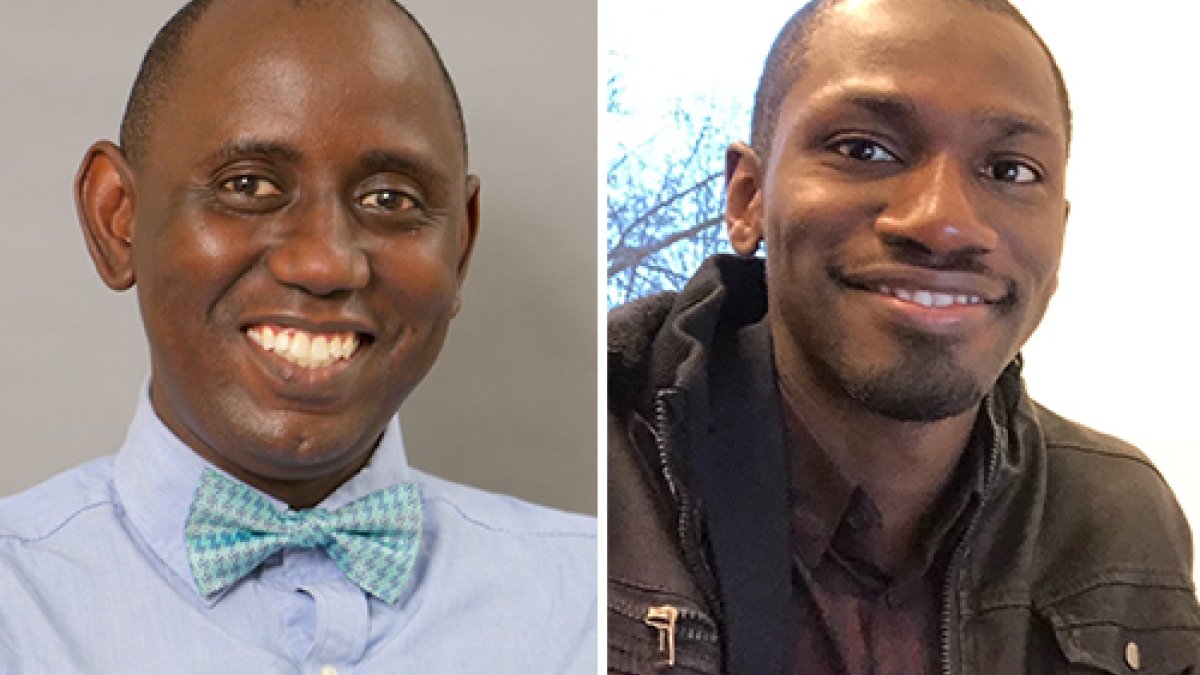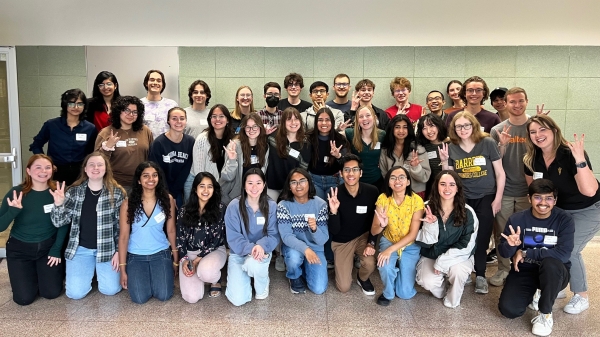2 ASU mathematicians win Bellman Prize for malaria transmission article

The work of Foundation Professor Abba Gumel (left) and ASU graduate Kamaldeen Okuneye presents a mathematical model to investigate the effect of temperature and rainfall on malaria transmission. The model predicts ranges for temperature and precipitation that yield maximum abundance of malaria mosquitoes and disease in the malaria-endemic area. It also leads to the development of an effective public health policy for combating the spread of — and potentially eradicating — malaria.
ASU graduate Kamaldeen Okuneye and Foundation Professor Abba B. Gumel have won the 16th Bellman Prize for their article "Analysis of a temperature- and rainfall-dependent model for malaria transmission dynamics," published in the journal Mathematical Biosciences.
This work presents a mathematical model to investigate the effect of temperature and rainfall on malaria transmission. The model predicts ranges for temperature and precipitation that yield maximum abundance of malaria mosquitoes and disease in the malaria-endemic area. It also leads to the development of an effective public health policy for combating the spread of — and potentially eradicating — malaria.
Gumel, of the School of Mathematical and Statistical Sciences, uses mathematical modeling approaches and analysis to gain insight into the transmission dynamics and control of emerging and reemerging infectious diseases.
Okuneye earned his PhD in applied mathematics from ASU in 2018, under the supervision of Gumel. His dissertation research focused on developing and analyzing compartmental models to assess the impact of temperature variability on malaria, a disease for which nearly half the human population is at risk. Okuneye is currently a senior scientist at Applied BioMath in Boston.
“It is always a great honor for an academic to be so recognized by his/her peers,” said Gumel. “It is exceptionally gratifying that it is a collaborative work with a former student — who did most of the heavy lifting — that is recognized by the global mathematical biology community.
“I am so proud of Dr. Okuneye's accomplishment. For me, personally, nothing is more rewarding that seeing the people we helped to train and mentor doing exceptionally well and being duly recognized for their excellence.”
The Bellman Prize is a biennial award to a research team or single investigator whose Mathematical Biosciences article has made an outstanding contribution to their research field over the last five years. The prize is awarded by the publishing house Elsevier at the annual meeting of the Society for Mathematical Biology to the corresponding authors of the selected Mathematical Biosciences publication.
The Bellman Prize was established in 1985 in honor of Richard Bellman (1920–1984), founder and editor-in-chief of Mathematical Biosciences. Between 1985 to 2015, the Bellman Prize was awarded every two years for the best paper published in Mathematical Biosciences over the preceding two years; after 2015 it changed to honoring the best paper over the preceding five years.
This marks the second time the Bellman Prize has been awarded to faculty in the School of Mathematical and Statistical Sciences. In 1999, Professor Hal Smith and postdoctoral researcher Mary Ballyk were honored for their work, "A model of microbial growth in a plug flow reactor with wall attachment." Smith retired from ASU last summer, and Ballyk is currently an associate professor of mathematics at New Mexico State University.
“It is clearly an honor to be chosen for the Bellman Prize, but even more impressive that our faculty were honored a second time, given how many talented researchers publish their work in Mathematical Biosciences,” said Donatella Danielli, professor and school director. “We congratulate Abba Gumel and Kamaldeen Okuneye on this recognition of their excellent work, and again thank Hal Smith for blazing the trail two decades ago in highlighting the significant role mathematical biology plays in helping to solve the world’s most challenging problems.”
Sara I. Abdelsalam and Kambiz Vafai (both from University of California, Riverside) earned an honorable mention for their work, "Particulate suspension effect on peristaltically induced unsteady pulsatile flow in a narrow artery: Blood flow model."
More Science and technology

Record number of ASU students selected for prestigious DAAD-RISE program
The Lorraine Frank Office of National Scholarships Advisement has announced that a record-high 34 Arizona State University…

ASU study identifies sex-based differences in physical aggression
Males are often more physically aggressive than females, whether it involves a school playground fight or assaulting another…

Industrial engineers develop new AI to elevate 3D printing
In the future imagined by Feng Ju, interior designers will have artificial intelligence, or AI, tools to create everything from…